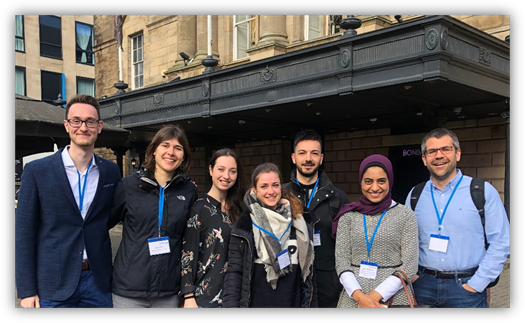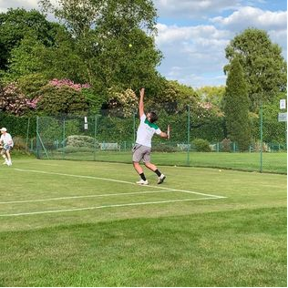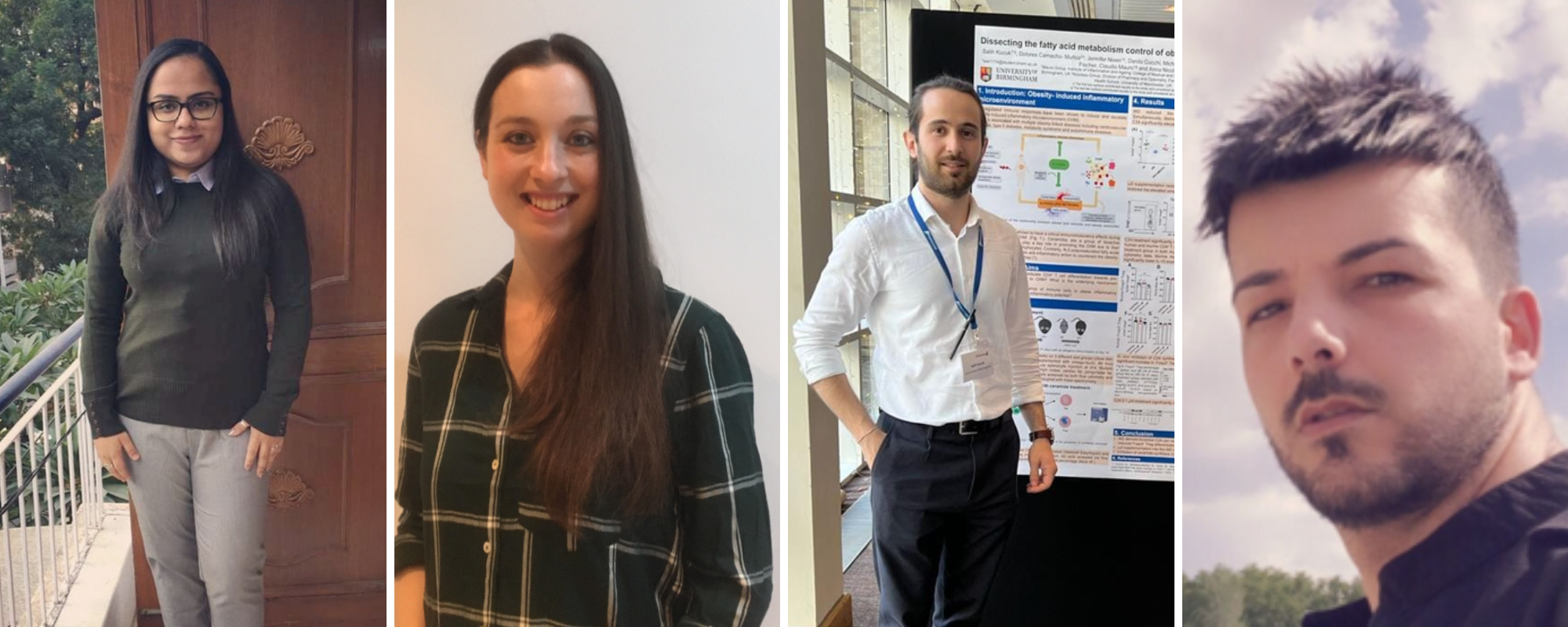Running a research lab is a complex progress, but seeing the lab come to life is an amazing experience. In this issue of Pharmacology Matters, we are visiting the Mauro lab to learn about Professor Claudio Mauro’s experience in establishing his group at the University of Birmingham.

The Mauro lab team.
Thank you very much for joining us, Prof. Mauro! Did you always aspire to become a Principal Investigator (PI)?
In Year 12, I had an interest in human biology & biochemistry, influenced by an inspiring teacher and the illness of my father (cancer). I completed my training in medical biotechnology and Laurea Degree. As I was inspired to become a scientist carrying out research on human diseases, I joined a lab at the University of Naples Federico II in October 1999. For a long time, I wondered whether I was good enough for the role as PI, as well as suffering from imposter syndrome. This was particularly evident following the publication of my postdoctoral work, first corresponding authors’ papers and independent funding. Time showed that I went well beyond what I dreamt to achieve when I was a student in Italy.
What is the general structure of your lab?
My lab started in November 2011 with a fixed term lectureship at
QMUL, supported by a
BHF fellowship. Initially, I had two key members - a research assistant (Joanne Smith) who did her PhD at the
Beatson Institute and a talented PhD student (Robert Haas) from Vienna. Thereafter, the lab was steadily made of 4-5 members. The group is now expanding, with
Alba Llibre (Assistant Professor), who initially joined us from the
Pasteur Institute with a
Marie-Curie fellowship, two senior postdocs (Michelangelo Certo & Jennifer Niven), 3 PhD students and several rotating BSc/MSc students & visiting fellows. In July 2023, we will have 12 members in the group. Currently, each senior member manages a mini-group within the team and everyone has independent tasks.
Tell us about your current research interests.
One key area of the research I lead is how metabolites, like lactate, which accumulates locally in the inflamed tissue or systemically during acute and chronic inflammation, can impact the fate of the immune-inflammatory response
via induction of intracellular metabolic rewiring with immediate effect on broad range human diseases. We also study how saturated and unsaturated fatty acids impact the outcomes of an immune response, with repercussions on obesity-related diseases. Overall,
our findings indicate that interfering with metabolic pathways (i.e. lipid, glucose, oxidative metabolism) alters immune cell effector functions and can be exploited for therapy.
These studies have generated funding from charities & research councils (
BHF,
VA,
MRC,
Horizon2020) and brought several invitations to seminars & international conferences, editor appointments (e.g.
British Journal of Pharmacology), memberships to grant evaluation board memberships (
VA,
JPI-HDHL,
UKRI FLF,
WT) and scientific advisory board (Lmito Therapeutics) as well as peer-review activities (e.g. Nature, Immunity, Nat Immunol, Cell Metab, Sci Transl Med).
Who has influenced you the most in your scientific career?
There are several people at the different stages of my career. My parents & brother were both an inspiration and a great support. My supervisor during my first fellowship at QMUL,
Prof. Marelli-Berg was instrumental in shaping my career and my vision of the research, including applying appropriate
in vivo studies.
Prof. Lord, CBE played an important role both academically and as an inspiration. Over the years, I have a network of mentors, generally initiated from serendipitous conversations at meetings, namely
Prof. Rot,
Senis and
Kemper, amongst several others.
What are some of the most surprising things you have learnt whilst setting up your lab?
I started my group without formal training and picked up bits of training daily, whether formally or informally. I would refer to the phrase, “
whatever you can dream”. I follow a few principles which are the catchphrases of my socials:
- “Ever tried. Ever failed. No matter. Try again. Fail again. Fail Better.”
- “Whatever you can do or dream you can, begin it. Boldness has genius, power & magic in it.”
- “It doesn’t make sense to hire smart people and then tell them what to do; we hire smart people so they can tell us what to do.” (This is particularly important as I discovered that empowering people in my team can lead to advancements well beyond what the PI had foreseen.)
How do you motivate your team members and stay up-to-date with the group?
By empowering them and making them believe they can achieve their goals. Together we do things that no one of us individually could have achieved, for instance new methodologies. We have weekly informal meetings where we discuss the latest experiments/challenges. Some of our meetings are joint with
Dr Niharika Duggal, with whom we share expertise. Additionally, we hold weekly ad hoc meetings to cover aspects of specific projects with individual subgroup involved.
What would be your advice on establishing collaborations?
Be open and frank with all colleagues. Never stop talking to colleagues and peers. The best things happened in my careers out of serendipitous conversations.
How did you develop the international visibility of your lab?
Publishing impactful research, whether by vision or with a bit of luck, propelled our international visibility. However, I am present on the main socials,
Twitter,
Facebook and
Instagram, where we try to communicate our achievements.
What is the best thing about teaching & training the next generation of early career researchers?
There are many great things of being a PI, especially seeing my group members performing well. As of now, a former PhD student is now an assistant professor in Hong Kong, a mentee is an assistant Professor in Shanghai, a student and postdoc have positions in prestigious companies. I am also proud to have mentored
my first group member into an assistant professorship. My dream of course is to see one of our discoveries into clinics for people’s benefit.
How do you maintain a work:life balance?
It is tough; I don’t deny it, I often struggle. Some days are good, others feel overwhelmed. However, I enjoy socialising with colleagues. One thing I love is tennis. I am a player and a fan, so I play tennis and watch it. Tennis has played a big part in my relocations as it has given me the opportunity to become part of local communities, beyond the work community, normalising my life.
 Prof. Mauro enjoying tennis, his key to a good work:life balance.
How do you foster inclusivity and diversity in your group?
Prof. Mauro enjoying tennis, his key to a good work:life balance.
How do you foster inclusivity and diversity in your group?
We are open to hire anyone who brings the right skillset to the lab. We use an inclusive approach and group members originate from different nationalities including England, Scotland, Italy, Spain, Cyprus, India, Pakistan and China. I am proud to say that since starting as a PI in 2011, my lab has six children born, including my two. When Jennifer was hired, we decided to wait several months for her to join us as she was on maternity but she was the right fit for the lab. What matters the most is that the team members care about science and each other, with the common aim of delivering impactful science.
What would be your biggest piece of advice for newly starting investigators on running a successful lab?
- There will be ups and downs. Enjoy the journey, even in the bleak moments. I wish I had been better at that.
- Network, network, network, beat your shyness.
- Surround yourself with people that care for you, whether colleagues, families or friends.
- Choose your team members carefully and care for them.
Meet the Mauro lab team
.png.aspx?width=525&height=210)
Atrayee Gope, MSc Student
Atrayee did a BSc (Hons) in Biological Science from the University of Delhi, followed by an MSc in Applied Biosciences & Biotechnology from Imperial College London. She joined the Mauro lab in 2021 to do research in Inflammation & Ageing. Her research project focusses on investigating the epigenetic mechanisms underpinning altered CD4 T cell responses in obesity. She will start her PhD in the Mauro lab in October 2023.
Why have you chosen the Mauro Lab for your PhD studentship?
Prof. Mauro is a wonderful supervisor, who is supportive. The lab members are not only great scientists but very friendly and helpful people. The lab is highly collaborative, with opportunity to work with talented scientists outside the team and participate in interdisciplinary research. The Mauro lab will provide me with the right support and guidance that I need to excel in my PhD program.
What would be your advice for prospective undergraduate students who are searching for a PhD project, host institutions and/or supervisors?
I believe the best way to go about is to email prospective supervisors and express your genuine interest in the area of research.
Dr Jennifer Niven, postdoctoral scientist
Jennifer completed her PhD in Aberdeen before starting her first postdoc at the University of Geneva in Switzerland, where she revealed a new mechanism coupling autophagy in dendritic cells to the function, homeostasis and stability of Tregs. She has joined the Mauro Lab where she investigates the long-term effect of high fat diet on CD4 T cell responses.
How did your interest in immunology arise?
I developed an interest in immunology, focusing on diet and immune response during my BSc research project (Aberdeen). This led me to investigate inflammatory response in autoimmune environments (PhD in Ocular inflammation) and arthritis (first postdoc). My postdoctoral training expanded my immunology knowledge. Both my interest in diet and CD4 T cells brought me to the Mauro lab, where I now investigate the long-term impact of high fat diet on CD4 T cell responses.
What are the three main challenges faced as an academic researcher?
- I currently have two young children (aged 4 and 2) - balancing family life, seeing my children by working part time and maintaining my research output have been challenging.
- The pressure to obtain external funding to maintain your position
- The pressure to produce high impact papers.
Salih Kucuk, PhD Student
Salih completed his high school education in Cyprus, followed by a BSc in Medical Genetics at QMUL and MSc in Molecular Medicine at Imperial College London. His research project focused on the effects high-sugar diet induced obesity in ageing of fruit fly drosophila models. This project and the guidance from Dr. Cochemé enabled him to develop an interest in obesity pathophysiology. Alongside his interest in immunology, he chose his niche for his PhD research project under Prof Claudio Mauro.
What was the highlight of your PhD project and/or training?
Being exposed to various collaborations (internal or external) instigated by Prof Mauro. This provided me with an understating of how vital collaborations with different fields (eg. lipidomics, epigenetics) and how combining different scientific approaches can enable us to understand the bigger picture of biological physiologies.
What advice would you give to a first year PhD student?
Accept yourself as a student and always look for opportunities to learn new methods and skills. Do not hesitate to make mistakes and understand that there is always room for development. Additionally: Read! Read! Read! Undertaking literature searchesgives you the power to fuel your research in a right, targeted way.
Dr Michelangelo Certo, postdoctoral scientist
Michelangelo completed a PhD in Cellular Biochemistry & Pharmacology from the University of Calabria (Italy). He conducted his postdoctoral training at the University of Calabria (2013), University College London (2016), QMUL (2017) and University of Birmingham (2018). His research explores the cellular and molecular mechanisms involved in the pathophysiology of chronic inflammatory diseases, such as atherosclerosis (BHF), Sjogren's syndrome (MRC funded) and stroke.
What are the three main challenges faced as an academic researcher?
- Funding: The struggle to secure funding for research projects limits the scope and quality of work.
- Time Management: Managing multiple projects & deadlines can be a daunting task, especially whilst balancing research with other responsibilities (eg. teaching, administrative duties, personal life).
- Publishing: This process is time-consuming and competitive, with limited space in top (high-impact) journals. The peer-review process is rigorous and demanding, requiring researchers to address feedback and criticism.
What inspired you to become a scientific illustrator?
I discovered scientific illustration while studying biology in college. I appreciated the idea of using art to communicate complex scientific concepts to a wider audience. Today, as a scientific illustrator, I create illustrations for a scientific publication or design educational materials for students. I am motivated by the belief that my work can help people to better understand and appreciate the wonders of science.
|
Twitter accounts:
@ClaudioMauro6
@MauroLab_bhamComments
If you are a British Pharmacological Society member, please
sign in to post comments.